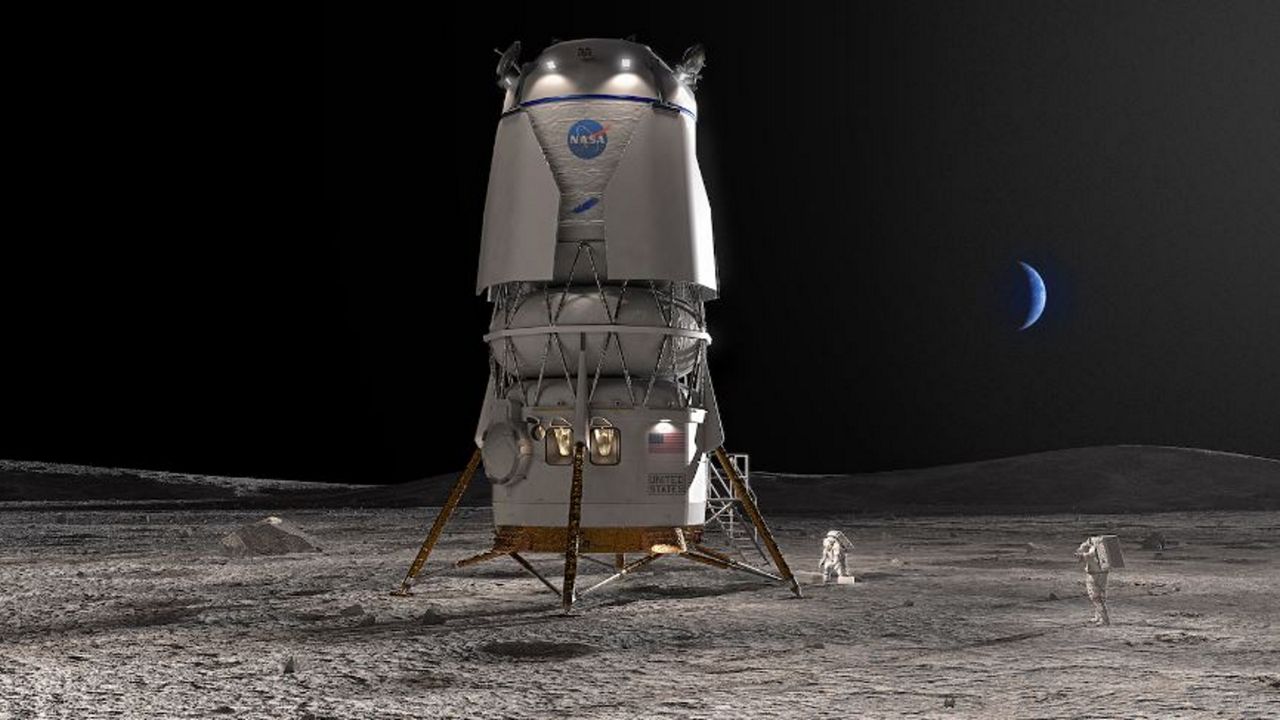CAPE CANAVERAL, Fla. — Jeff Bezos’ rocket company has won a NASA contract to land astronauts on the moon, two years after it lost out to SpaceX.
Blue Origin received a $3.4 billion contract Friday to lead a team to develop a lunar lander named Blue Moon. It will be used to transport astronauts to the lunar surface as early as 2029, following a pair of crew landings by Elon Musk’s SpaceX.
What You Need To Know
- NASA awards Blue Origin a contract for a second lunar lander
- The lunar lander will be named Blue Moon
- It could take astronauts to the surface of the moon as early as 2029
- Elon Musk's SpaceX won the contract for the first lunar lander
Honored to be on this journey with @NASA to land astronauts on the Moon — this time to stay. Together, we’ll be solving the boil-off problem and making LOX-LH2 a storable propellant combination, pushing forward the state of the art for all deep space missions. #Artemis… pic.twitter.com/Y0zDhnp1qX
— Jeff Bezos (@JeffBezos) May 19, 2023
NASA will get astronauts to lunar orbit using its own rockets and capsules, but it wants private companies to take over from there.
NASA Administrator Bill Nelson said the agency wants different landing options as it seeks a return to the moon more than a half-century after the end of the Apollo moonshots.
Blue Origin is kicking in billions of dollars, on top of the NASA contract, to help establish a permanent presence on the moon.
“We have a lot to do before we successfully land and return astronauts,” said John Couluris, a Blue Origin vice president.
According to Blue Origin, lower performing but more easily storable propellants (such as hydrazine and nitrogen tetroxide, which were used on the Apollo lunar landers) have been favored for deep space missions because of the boil-off of LOX-LH2 during long mission timelines.
In announcing the award on its website, Blue Origin said it plans to make a "high-performance LOX-LH2 a storable propellant combination."
"Under SLD (the Sustaining Lunar Development contract), we will develop and fly solar-powered 20-degree Kelvin cryocoolers and the other technologies required to prevent LOX-LH2 boil-off," the company said.
Two years ago, Blue Origin sued after NASA awarded SpaceX the contract for the first lunar landing. A federal judge upheld the space agency’s decision.
NASA’s Artemis program, which follows the 1960s and 1970s Apollo moonshots, kicked off with a successful test flight late last year. Launched atop NASA’s new moon rocket, an empty Orion capsule went into lunar orbit before returning home.
The next Artemis flight will come late next year, when one Canadian and three U.S. astronauts fly to the moon and back, but not land. Two Americans would descend to the lunar surface aboard a SpaceX Starship on the mission after that, no earlier than late 2025.
Like SpaceX, Blue Origin plans to practice landing on the moon without a crew before putting astronauts on board.
While the shiny, stainless steel Starship has a science fiction look, Blue Moon resembles more of a traditional capsule perched atop a tall compartment with legs. The latter will stand 52 feet (16 meters) on the moon.
Both companies’ landers are meant to be reusable.
Blue Origin will use its still-in-development New Glenn rocket to launch its lunar missions from Cape Canaveral.
Starship, the world’s largest rocket, made its debut last month from South Texas; the test flight ended in an explosive fireball a few minutes into flight.
Blue Origin’s team includes five partners: Lockheed Martin, Boeing, Draper, Astrobotic Technology and Honeybee Robotics.
Only one other bid was submitted for the contract competition, according to NASA.
Leidos, the parent company of Dynetics, issued a statement after the award. Dynetics led the team on the other proposal considered by NASA.
"Helping NASA with the inspiring efforts to return to the Moon will remain a priority for Leidos," the statement said. "The Artemis missions require multiple partners to achieve success, and our Leidos-Dynetics team is committed to continuing to assist on these critical missions. We are proud of the great progress on our current work with NASA, such as designing and developing the Universal Stage Adapter for the Space Launch System and delivery of laser air monitoring systems for Orion, along with working to design a Lunar Terrain Vehicle. We have a strong history of leveraging our technical expertise to support the International Space Station, NASA missions and the NASA enterprise. Leidos will remain focused on developing advanced technologies and innovations to enable safe and sustainable exploration and discovery to the Moon and beyond."
Spectrum News 13's Will Robinson-Smith contributed to this report.



